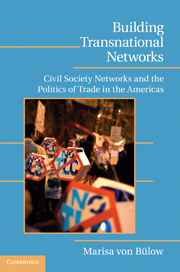Book contents
- Frontmatter
- Contents
- List of Figures
- List of Tables
- Acknowledgments
- Part One Civil Society Organizations and Their Pathways to Transnationality
- Part Two The Politicization of Trade
- Part Three The Dynamics of Networks
- Part Four Organizational Pathways to Transnationality
- Part Five The Search for Ideational Pathways
- 9 ALTERNATIVES FOR THE AMERICAS
- 10 TRANSNATIONAL COLLECTIVE ACTION IN DYNAMIC POLITICAL CONTEXTS
- 11 CONCLUSIONS: AGENCY, NETWORKS, AND COLLECTIVE ACTION
- Main Abbreviations Used
- Appendix A Lists of Interviews
- Appendix B Social Network Questionnaire (United States)
- Bibliography
- Index
11 - CONCLUSIONS: AGENCY, NETWORKS, AND COLLECTIVE ACTION
Published online by Cambridge University Press: 05 October 2010
- Frontmatter
- Contents
- List of Figures
- List of Tables
- Acknowledgments
- Part One Civil Society Organizations and Their Pathways to Transnationality
- Part Two The Politicization of Trade
- Part Three The Dynamics of Networks
- Part Four Organizational Pathways to Transnationality
- Part Five The Search for Ideational Pathways
- 9 ALTERNATIVES FOR THE AMERICAS
- 10 TRANSNATIONAL COLLECTIVE ACTION IN DYNAMIC POLITICAL CONTEXTS
- 11 CONCLUSIONS: AGENCY, NETWORKS, AND COLLECTIVE ACTION
- Main Abbreviations Used
- Appendix A Lists of Interviews
- Appendix B Social Network Questionnaire (United States)
- Bibliography
- Index
Summary
The dynamic contours of transnational collective action are the result of the continuous negotiation and reappraisal of choices made by actors, as they become part of new networks and react to changes in political contexts. These processes of negotiation and reappraisal happen within as well as among civil society organizations (CSOs) and inside as well as outside national boundaries. Their outcomes cannot be predetermined from a set of economic or political structures. Although structural analysis of the forces of globalization or capitalism can help in explaining the increased relevance of transnational collective action, they give us few clues on why CSOs differ in the ways in which they seek to be a part of a globalizing world, and how these pathways vary through time.
The agency-centered approach used in this book spotlights dimensions of transnational collective action that we cannot ignore if we want to understand how and why civil society's repertoires of contention are changing. In these conclusions, I will highlight two, whose importance has been asserted repeatedly throughout the book: (1) the national, or domestic, dimension, and (2) the asymmetry dimension, both of which I regard as constitutive of transnational collective action. These dimensions became visible because of the focus of the research on the relational and political embeddedness of CSOs, that is, the importance given to the analysis of actors' networks and their dynamic relationships, and the relevance attributed to the specific political contexts in which they build coalitions, define their goals, and articulate their frames.
- Type
- Chapter
- Information
- Building Transnational NetworksCivil Society and the Politics of Trade in the Americas, pp. 190 - 200Publisher: Cambridge University PressPrint publication year: 2010

